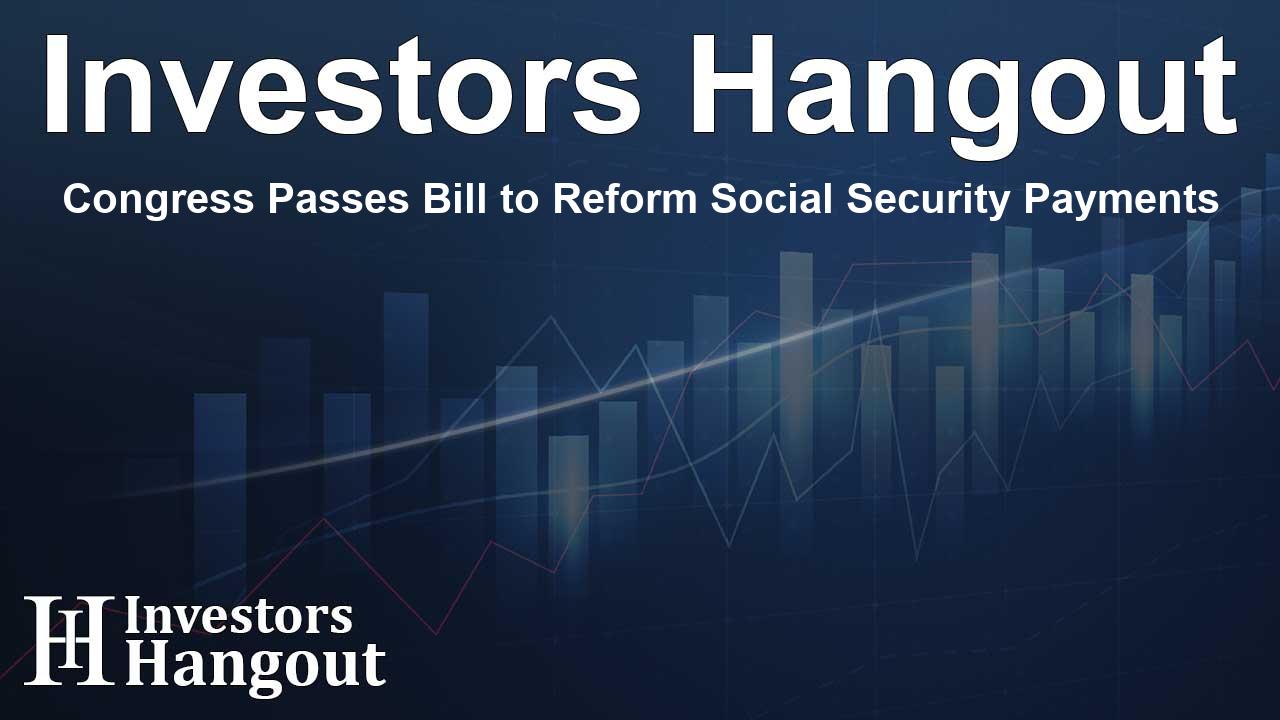Congress Passes Bill to Reform Social Security Payments

Congressional Approval of Social Security Changes
In a significant move, the U.S. Congress voted to modify Social Security retirement payments, particularly benefiting retirees who currently receive public pensions. This change was prompted by a bipartisan effort in the Senate, where the bill’s passage did raise several concerns about its potential long-term impact on the Social Security system.
Details of the Social Security Fairness Act
The Senate approved the Social Security Fairness Act with a notable 76-20 bipartisan vote. This legislation aims to repeal provisions that have been in place for two decades, which previously reduced benefits for individuals who also receive pensions from public service jobs, such as firefighters and police officers. Following the Senate's approval, the bill is set to be sent to President Joe Biden for his signature, indicating a substantial step toward reforming the program's benefits.
Impact on Current Beneficiaries
Experts estimate that around 2.5 million Americans, approximately 3% of Social Security beneficiaries, will be directly affected by the revised provisions. With these changes, many individuals could see an increase in their monthly federal benefits, potentially amounting to hundreds of dollars, enhancing their financial stability during retirement.
Concerns Over Program's Finances
However, amidst this push for reform, several federal budget analysts warn that the bill could detrimentally affect the already unstable finances of the Social Security program. The nonpartisan Congressional Budget Office has assessed the cost of the proposed changes to be around $196 billion over the next decade, a substantial price tag given the program's current fiscal challenges.
Reactions from Lawmakers and Experts
The passage of the bill has led to mixed reactions among lawmakers and experts. Supporters of the bill argue that addressing the needs of current retirees is essential and that the future of Social Security can be looked at later. Conversely, critics, including some Republican Senators, express concern that such legislative actions could jeopardize the program's stability, especially with looming deadlines regarding the trust fund's solvency.
Potential Solutions for Long-term Issues
In response to these critiques, other proposals have been suggested, including revisiting the formulas used to calculate retirement benefits for public sector workers. Legislative discussions continue about how to ensure that Social Security remains a viable source of income for future retirees while addressing the entitlement program’s financial health.
Future Implications for Social Security
The ongoing discussions regarding the Social Security Fairness Act underline the complexities surrounding retirement benefits in the U.S. As lawmakers navigate the intricacies of budget appropriations and program funding, many Americans watch closely to understand how these changes might affect their financial futures.
Addressing Concerns for Retirees
As this legislation takes center stage, it's vital for those affected to stay informed about updates from the Social Security Administration. Understanding the expected benefits and potential adjustments can help individuals better prepare for their retirement years.
Frequently Asked Questions
What is the Social Security Fairness Act?
The Social Security Fairness Act aims to repeal provisions that reduce benefits for retirees who also receive public pensions.
Who will be impacted by the new Social Security provisions?
Approximately 2.5 million Americans, particularly those with public pensions, will see an increase in their benefits.
What are the financial implications of this bill?
The Congressional Budget Office estimates the changes will cost around $196 billion over the next decade, raising concerns about Social Security's fiscal sustainability.
How have lawmakers reacted to this bill?
Lawmakers' reactions vary, with supporters emphasizing the needs of current retirees while critics warn about the long-term consequences for the program.
What should retirees do in light of these changes?
Retirees should stay informed on the updates from the Social Security Administration to understand how their benefits may be affected going forward.
About Investors Hangout
Investors Hangout is a leading online stock forum for financial discussion and learning, offering a wide range of free tools and resources. It draws in traders of all levels, who exchange market knowledge, investigate trading tactics, and keep an eye on industry developments in real time. Featuring financial articles, stock message boards, quotes, charts, company profiles, and live news updates. Through cooperative learning and a wealth of informational resources, it helps users from novices creating their first portfolios to experts honing their techniques. Join Investors Hangout today: https://investorshangout.com/
Disclaimer: The content of this article is solely for general informational purposes only; it does not represent legal, financial, or investment advice. Investors Hangout does not offer financial advice; the author is not a licensed financial advisor. Consult a qualified advisor before making any financial or investment decisions based on this article. The author's interpretation of publicly available data shapes the opinions presented here; as a result, they should not be taken as advice to purchase, sell, or hold any securities mentioned or any other investments. The author does not guarantee the accuracy, completeness, or timeliness of any material, providing it "as is." Information and market conditions may change; past performance is not indicative of future outcomes. If any of the material offered here is inaccurate, please contact us for corrections.